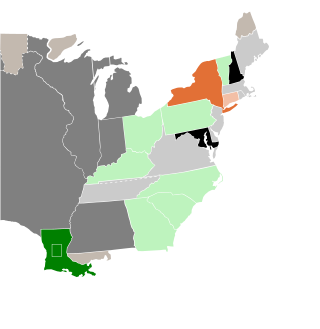A special election was held in Georgia's at-large congressional district on December 13, 1813 [1] to fill a vacancy left by the resignation of William W. Bibb (DR) on November 6, 1813, after being elected to the Senate. [2]
| Elections in Georgia |
|---|
 |
A special election was held in Georgia's at-large congressional district on December 13, 1813 [1] to fill a vacancy left by the resignation of William W. Bibb (DR) on November 6, 1813, after being elected to the Senate. [2]
| Candidate | Party | Votes [3] | Percent |
|---|---|---|---|
| Alfred Cuthbert | Democratic-Republican | 2,251 | 36.0% |
| Benjamin Skrine | [4] | 1,512 | 24.2% |
| William Terrell | Democratic-Republican | 1,263 | 20.2% |
| John Dooly | [4] | 1,233 | 19.7% |
Cuthbert took his seat on February 7, 1814 [2]

The 1812–13 United States House of Representatives elections were held on various dates in various states between August 3, 1812, and April 30, 1813. Each state set its own date for its elections to the House of Representatives before the first session of the 13th United States Congress convened on May 24, 1813. They coincided with James Madison being re-elected president.

New York's 20th congressional district is a congressional district for the United States House of Representatives in New York's Capital District. It includes all of Albany, Saratoga, and Schenectady counties, and portions of Montgomery and Rensselaer counties.
New York's 21st congressional district is a congressional district for the United States House of Representatives that is represented by Republican Elise Stefanik. On November 11, 2024, President-elect Donald Trump announced his intention to nominate Stefanik to serve as the United States Ambassador to the United Nations. If confirmed by the Senate, this would create a vacancy in her district, prompting a special election to fill the seat.

Virginia's first congressional district is a United States congressional district in the commonwealth of Virginia.

The 1812–13 United States Senate elections were held on various dates in various states, coinciding with President James Madison's re-election. As these U.S. Senate elections were prior to the ratification of the Seventeenth Amendment in 1913, senators were chosen by state legislatures. Senators were elected over a wide range of time throughout 1812 and 1813, and a seat may have been filled months late or remained vacant due to legislative deadlock. In these elections, terms were up for the senators in Class 3.

The 1812 United States House of Representatives elections in New York were held from December 15 to 17, 1812, to elect 27 U.S. Representatives to represent the State of New York in the United States House of Representatives of the 13th United States Congress. At the same time, a vacancy was filled in the 12th United States Congress.

Elections to the United States House of Representatives were held in Pennsylvania on October 13, 1812, for the 13th Congress.
Massachusetts gained three seats after the 1810 census, all of which were added to the District of Maine. Its elections were held November 5, 1812, but since Massachusetts law required a majority for election, which was not met in the 19th district, a second ballot was held there January 6, 1813.

The 1810 census revealed dramatic population growth in Ohio since 1800, resulting in its representation increasing from a single Representative to six, resulting in the State being broken up into 6 districts, abolishing the at-large district. Jeremiah Morrow (Democratic-Republican), who had served since Ohio achieved statehood in 1803, retired to run for U.S. Senator, so that all six seats were open. Its elections were held October 13, 1812.

A special election was held in New York's 15th congressional district to fill a vacancy left by the death of Representative-elect William Dowse (F) on February 18, 1813, before the beginning of the 13th Congress. The election was held April 27–29, 1813.

On August 2, 1813, at the end of the 1st session of the 13th Congress, Egbert Benson (F) of New York's 2nd district resigned. A special election was held for his replacement December 28–30, 1813.

A special election was held in Pennsylvania's 7th congressional district on October 12, 1813 to fill a vacancy left by the resignation of John M. Hyneman (DR) on August 2, 1813

On August 2, 1813, Representative John Gloninger (F) of Pennsylvania's 3rd district resigned his seat. A special election to fill this vacancy was held on October 12, 1813. This was the first of two special elections held in the 3rd district in the 13th Congress.

A special election was held in North Carolina's 3rd congressional district on January 11, 1813, to fill a vacancy left by the death of Thomas Blount (DR) on February 7, 1812.
A special election was held in Massachusetts's 17th congressional district on April 6, 1812, to fill the vacancy left by the resignation of Barzillai Gannett (DR) who resigned sometime in 1812 without having served.
A special election was held in New York's 6th congressional district December 15–17, 1812 to fill a vacancy left by the resignation of Robert Le Roy Livingston (F) on May 6, 1812

A special election was held in Ohio's 3rd congressional district on May 10, 1813, to fill a vacancy left by the resignation of Duncan McArthur (DR) on April 5, 1813, before Congress assembled.